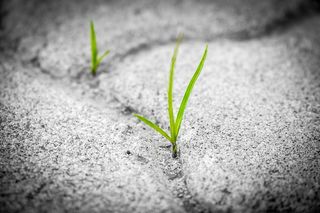Motivation
Why Hope Matters
Hoping we can make things better is the secret to doing so.
Posted February 5, 2019 Reviewed by Jessica Schrader

My first November as a professional writer wasn’t an easy one. My only client failed to pay his bill, I was receiving more rejections than assignments, my arthritis was flaring and my cat got $1,200-worth-of-vet-bills sick. I didn’t know how I was going to make my house payment and my stomach was upset. I stopped sleeping. But, I never stopped hoping. I believed that I could make this writing business work, and I set to work making that happen.
Hope Comes With the Possibility of Something Better
Hope implies that there is the possibility of a better future, according to the famed hope researcher C.R. Snyder. It shows up at the worst possible time when things are dire and difficult, but can keep us going during those hard moments. If during the difficulty, we can see the faint glimmer of something better, then hope “opens us up,” says Barbara Fredrickson, a positive psychology researcher. And turn us toward something better.
Hope is not a passive exercise in wishing, but an active approach to life, arising when there is something we want when we've got a clear goal in mind. And though it may be tough going, we’ll develop a plan to get us closer to where we want to go.
My goal was to be a full-time writer. My plan included sending out dozens of queries each week, writing every day, working with a mentor, taking classes. I taught to make ends meet. Did some public relations work, wrote at night. And, I was willing to take an early-morning job delivering papers if I needed. Anything to leave time to write.
Through each of these actions, I made a little progress. Experienced a little success. Made a little money, sold a short article, became a better writer. Those things kept me hoping, and that hope motivated me to keep working toward the ultimate goal.
Hope is motivating for me, even now, 23 years later. It’s not a delusional wishing things away, but a clarity of vision. Once you have your goal in mind, then you can get busy doing the things you need to get there. It helps me feel more empowered and less stressed.
And right now, that matters more than ever. Looking at the challenges we face, the hostility and adversity that seems to be seeping into the corners of our culture, the hope that we can make a positive difference in our families and communities can help us do it. Can help us move from the negative into something a little better.
Hope Helps Us Keep Going
Research indicates that hope can help us manage stress and anxiety and cope with adversity. It contributes to our well-being and happiness and motivates positive action. Hopeful people believe they can influence their goals, that their efforts can have a positive impact. They are also more likely to make healthy choices to eat better or exercise, or do the other things that will help them move toward what they are hoping for.
Then, other positive emotions such as courage and confidence (self-efficacy) and happiness emerge. They become our coping strategy, the emotions crucial in helping us survive. They allow us to take a wider view, become more creative in our approach and problem solving, and retain our optimism.
Hope isn’t delusional. It isn’t denial. It doesn't ignore the real challenges, details of the diagnosis, or dwindling money in the checking account. It is not woo-woo thinking.
It doesn’t ignore the trouble, or make excuses, or deny danger. It is not pretending. It is acknowledging the truth of the situation and working to find the best way to cope. It’s showing up and working through the hard stuff, believing that something better is possible. It’s resilient.
We can prime ourselves to hope, to move closer to optimism and action. Here’s how:
Seek inspiration and awe. Research by psychologist Dacher Keltner, PhD., shows that when we are so moved by something that we can hardly find the words to talk about it we are experiencing awe and that creates meaning, and positive feeling which contributes to a sense of hopefulness that can keep us moving forward. Awe reminds us of something bigger and vast. Causes us to slow down, think about what's important to us, and connect in a deeper way. I feel it every time I look at the ocean, and there is nothing more hopeful to me than watching the waves, roll in an out no matter what's going on around them.
Re-identify your goals. Maintaining a clear vision about what’s important and what we want to contribute and achieve also contributes to hope. When you are reminded of your big goals, the things that drive you to get up in the morning, you reconnect with your deeper values. Then, you’re more likely to persist because the process—the lifestyle that comes from living close to your values—helps you prevail despite obstacles.
Appreciate the setbacks and move through them. Hope is strengthened exponentially when you hit a setback and you persist despite it. Next time you run up against one, pay attention to what it offers you—a growth opportunity, a chance to learn something you need to know to accomplish your goals—then move through that challenge.
We all know tough times are going to come. Maybe you are in one now. Hope reminds us that we can continue and despite challenges, and pursue greater possibilities.
That’s a powerful feeling. One that keeps us moving instead of staying stuck in the despair.
It worked for me early on in my career—I did make the house payment, I’m still self-employed, still writing. Still hoping.




